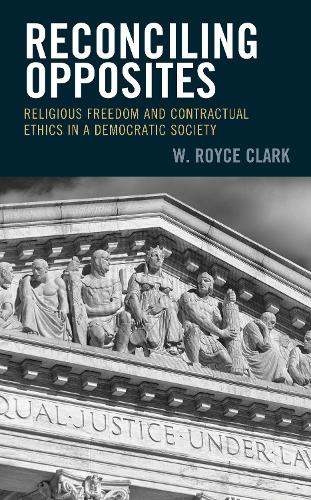
Reconciling Opposites: Religious Freedom and Contractual Ethics in a Democratic Society
(Hardback)
Publishing Details
Reconciling Opposites: Religious Freedom and Contractual Ethics in a Democratic Society
By (Author) W. Royce Clark
Bloomsbury Publishing PLC
Lexington Books/Fortress Academic
4th February 2022
United States
Classifications
Professional and Scholarly
Non Fiction
History of the Americas
Social groups: religious groups and communities
320.473
Physical Properties
Hardback
582
Width 161mm, Height 227mm, Spine 48mm
1039g
Description
The American justice system was founded on the idea of majority-rule, but in a democracy this is achievable only if the majority has the interests of the whole at heart. Since the days of Americas founding, white, Christian males created laws from their standpoint as the majority, leading them to exercise power in a largely majoritarian way rather than upholding the interests of all citizens. The nation has not realized its stated ideals of equality of liberty, opportunity and justice for all. As a solution, W. Royce Clark formulates a non-majoritarian ethic based not on any majority but on a universal instinct, the combination of Albert Schweitzers will-to-live and Friedrich Nietzsches will-to-power, along with democratic principles articulated by John Rawls and James Madison, which would represent all citizens.
Reviews
In a diverse and religiously pluralistic society, where do people find the ethical principles that provide the foundation for a truly democratic republic Theologian, ethicist, and legal scholar W. Royce Clark contends that the Framers of America's founding documents and recent decisions of the Supreme Court reveal the need for a more inclusive ethic based upon secular principles that elicit broad and voluntary support. This thought-provoking volume also raises important philosophical and theological questions for those seeking to gain political power and privilege in order to legislate morality based upon a religious ethic.
--Daniel A. Rodriguez, Pepperdine UniversityThis important volume disentangles humanity's longstanding problem, which is to understand better the interrelatedness and disengagement between religion and social structures. Professor Clark challenges one to ponder: Does religion produce social beings; or, do social beings erect frameworks of human interaction and engagement undergirded by biased ethical principles This book helps one flesh out such concerns.
--DeWayne R. Stallworth, American Baptist CollegeAuthor Bio
W. Royce Clark is professor emeritus of Pepperdine University.
